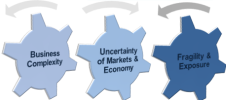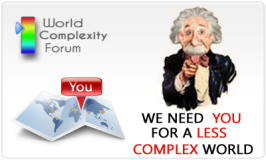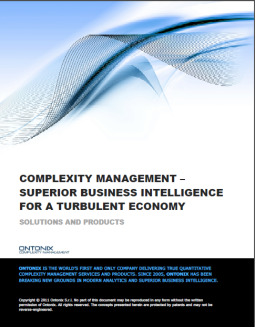A lot more than Management Consultants NEED to learn from “interactions” and interdependencies IF their particular skill-set is to remain relevant. The world is better understood when viewed, as it can be in the Digital Age, as an infinite series of inter-connected systems.
![Complexity (of the 'system' - business model, or corporation, etc.) x Uncertainty (of the environment, market, economy) = Fragility (of the situation) Evidently, U cannot be managed but C can. Measuring, monitoring and managing 'current complexity' is more effective than conventional means of assessing, rating, managing and modelling risk. And why it is better that a system be less complex [Occam's Razor]. The best way to impact C is by starting from the top of the Complexity profile. Because the profile is computed based on a model-free method, there are no subjective 'weights' to adjust. Basically, this guarantees that you hit the most important parameters first, i.e the hubs. A system CANNOT perform functions for which it was intended without, first, possessing and maintaining the minimum amount of complexity to do so. Therefore, by monitoring current complexity, the potential risks associated with loss of function(s) due to endogenous events, are preceded by 'fluctuations' in the complexity measure](https://fitforrandomness.wordpress.com/wp-content/uploads/2012/02/cxuf.png?w=300&h=132)
Complexity (of the ‘system’ – business model, or corporation, etc.)
x
Uncertainty (of the environment, market, economy)
= Fragility (of the situation)
Evidently, U cannot be managed but C can.
Measuring, monitoring and managing ‘current complexity’ is more effective than conventional means of assessing, rating, managing and modelling risk. And why it is better that a system be less complex [Occam’s Razor].
The best way to impact C is by starting from the top of the Complexity profile. Because the profile is computed based on a model-free method, there are no subjective ‘weights’ to adjust. Basically, this guarantees that you hit the most important parameters first, i.e the hubs.
A system CANNOT perform functions for which it was intended without, first, possessing and maintaining the minimum amount of complexity to do so. Therefore, by monitoring current complexity, the potential risks associated with loss of function(s) due to endogenous events, are preceded by ‘fluctuations’ in the complexity measure
The core message is that both THREAT & OPPORTUNITY lie within such (inter) connectedness but the winners of the current, turbulent and competitive marketplaces are those who understand the real power of creating RESILIENCE by
developing TRUST & INTERDEPENDENCE (the collaboration that the author highlights).
But you cannot buy trust. It has to be earned and, in times of such ambiguity and uncertainty, competition without differentiation (beyond pricing) is not sufficient.
As Clay Shirky famously(?) said “It is easier to understand that you face competition than obsolescence”
The ‘Risk Leaders’ of the future need to recognise that to accelerate the process of understanding they require to trade TRANSPARENCY – demonstrable, shared, principles – for INFORMATION. Otherwise the (oft overlooked) frictional costs associated with transforming data into information remain. Along with the unidentified sources of excessive complexity and ‘manageable’ risk that, unmanaged, add to volatility, increased uncertainty and – when spread through interactions – can lead to contagion (or ‘systemic risk’)!
We are living in a knowledge driven economy that is
 heavily influenced by collaborative forces sharing intangible and tangible assets to create new value. The internet has accelerated collaboration and people are learning from the interactions.
heavily influenced by collaborative forces sharing intangible and tangible assets to create new value. The internet has accelerated collaboration and people are learning from the interactions.
Why Management Consulting Will Be Disrupted: Part 1.




![Complexity (of the 'system' - business model, or corporation, etc.) x Uncertainty (of the environment, market, economy) = Fragility (of the situation) Evidently, U cannot be managed but C can. Measuring, monitoring and managing 'current complexity' is more effective than conventional means of assessing, rating, managing and modelling risk. And why it is better that a system be less complex [Occam's Razor]. The best way to impact C is by starting from the top of the Complexity profile. Because the profile is computed based on a model-free method, there are no subjective 'weights' to adjust. Basically, this guarantees that you hit the most important parameters first, i.e the hubs. A system CANNOT perform functions for which it was intended without, first, possessing and maintaining the minimum amount of complexity to do so. Therefore, by monitoring current complexity, the potential risks associated with loss of function(s) due to endogenous events, are preceded by 'fluctuations' in the complexity measure](https://fitforrandomness.wordpress.com/wp-content/uploads/2012/02/cxuf.png?w=300&h=132)













